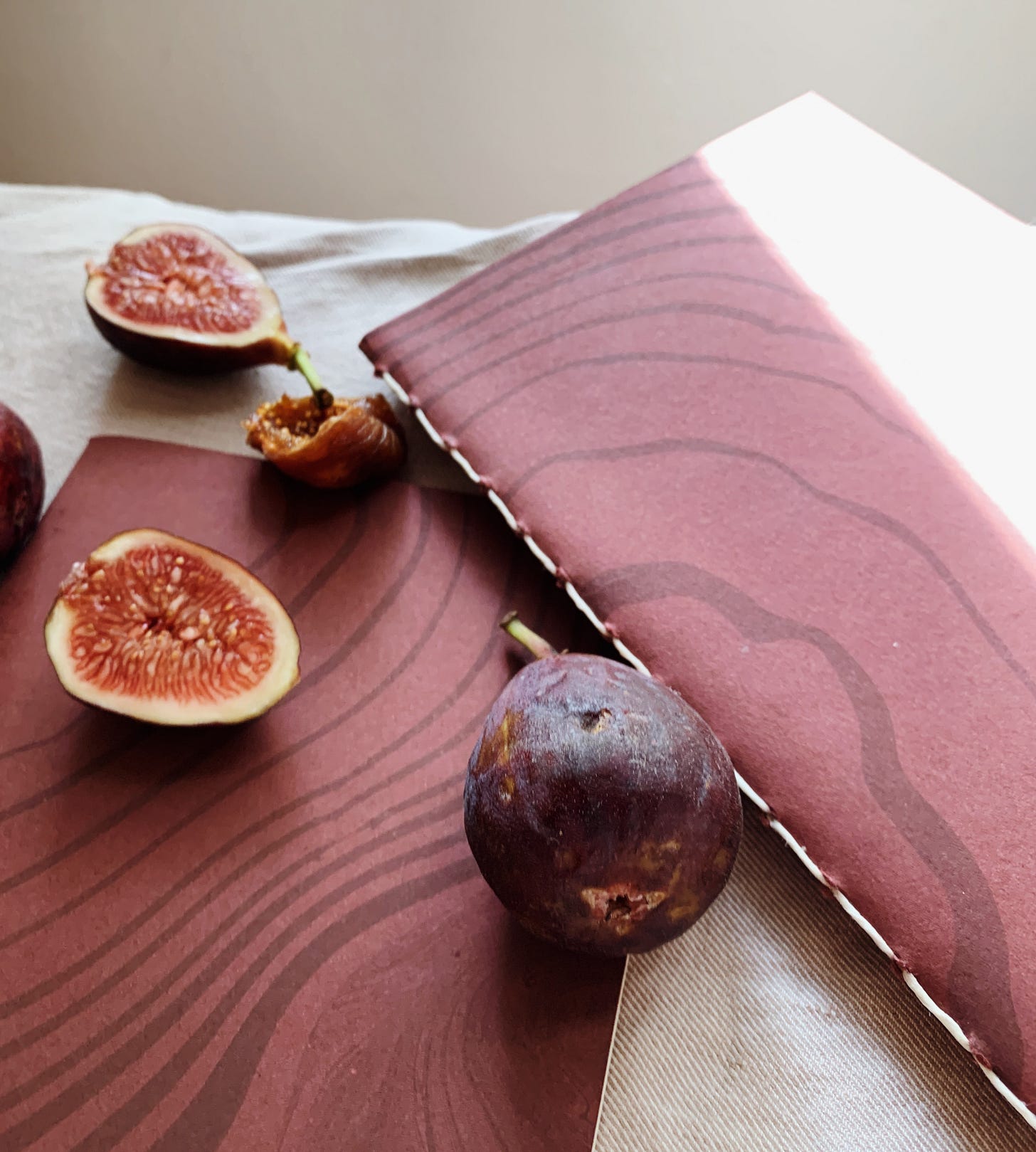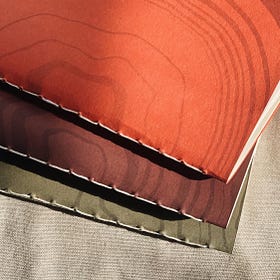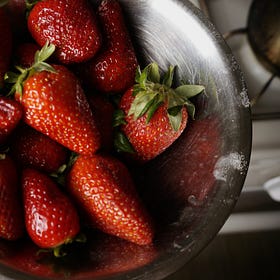Writing is Nourishing
On simplicity and cooking, and body-heart-mind in kitchen.
Looking for to nourish your creative life? If you’re in New York or Chicago, join in for a workshops. To start, strengthen, or sustain a creative writing or meditation practice, schedule a virtual 1:1 session. As always, listen to these essays in podcast form here, share with a friend, upgrade your subscription, or pair your creative practice with a journal from Odette Press.
“So you must simply pay attention, trust yourself, and decide.”
― Tamar Adler, An Everlasting Meal: Cooking with Economy and Grace
*
“To find the universal elements enough; to find the air and the water exhilarating; to be refreshed by a morning walk or an evening saunter… to be thrilled by the stars at night; to be elated over a bird’s nest or a wildflower in spring… these are some of the rewards of the simple life.”
— John Burroughs, Leaf and Tendril
Simplicity is the wind that weaves into Sunday’s open window. Wind is silent, unless it howls; invisible, unless brought to form through curls of smoke, and serene in its moving. Drops of water cascade down bowls of bright red berries, in anticipating sweetness, while beams of light insist their ways through canopies of trees, coaxing, compromising, pushing heat toward sidewalks. The day glows, and sun pours flat light wide across the kitchen, onto cutting board and carrots, orange and sturdy, catching hints of steam rising from a cooling soup on the stove. Roses, bright in red, peach, pink blush in petals’ fullness on the streets. Fig trees fan out fragrant leaves in nearby yards. After berries, I rinse fronds of dill and a bouquet of parsley in the sink. Drops of water add up like words and days, sentences amassing in lingering bowls in the sink. Some silence, like wind, makes its way into the kitchen, and I feel the start of an inhale. Breath rises and falls.
Midday after breakfast settles, I find the rhythms of writing. The pages are process — are they usable? Or do they become next month’s compost, tomorrow’s soup? Do I freeze them in clear containers for later, or hope that with heat and time, the ideas will come through? Chopping herbs, fruit, vegetables, idea form into tastes, letters, and sentences. I wash dishes, clean sentences, repeating rhythms of days.
*
In a picture that exists somewhere, I suspect, on my father’s kitchen counter, is an image of a much younger self. An image of decades ago: I was deep in thought, in the years when when blonde was sunlight stretched through my straighter hair. Maybe kindergarten, I was newly moved to a new state, and in the image I am deep in thinking, feeling, sensing, hands nearby a bowl, a plate, a spoon, zoning out in a child-size kitchen to some feel or flow state.
I can’t know what I was thinking, but I know that when my eyes occasionally find the image I call up the tender lingering vestiges of her, this younger version of self, or imagine her ever so often now, standing by the bright spark heat of the stove, tuning into tasting and texture and time, running tips of fingers through fruit, praying to the garlic skin altars, hands gently gripping and releasing through piles of oat and flour and butter into steel bowls. Sitting and writing at the table, I conjure up this wonder, her wonder, her interests, her interruption, her focused face, her experimentation. In those years, where most needs to create would drive me, as they do now, to the easiest, way I could pour energy into some channel of creativity: to page, to kitchen.
Somewhere along the lines — in points I can vaguely sense and sometimes point to — I find tastes and hints of pressures and fractures, insights and beginnings. Looking through to earlier forms, I find some origins of overthinking, understanding, then the art of hands, the impulse or need to make something to ground. Find something felt, sensed, or tactile; I’d cook; I’d bake; I’d paint, building felt language around the ways that something with texture and weight returned, as it still returns me, to the ground of my being. I come from lines of handiwork — ancestors whose caring hands, steady arms, and lines of thinking made stitches, made homes, took two hands wrapped around tongs for canning and preserving, fixed cars, soldered wires, made bakes in batches, and cooked. Now, my hands flower out in process: palms trace water and ground, hands move slow in a bowl, while mind slows and fasts, gliding word and ideas across screens in rhythm of writing. Live in the present tense of these lineages through words, thoughts, feelings, and hands, rooting from idea, transforming feeling and thinking into making.
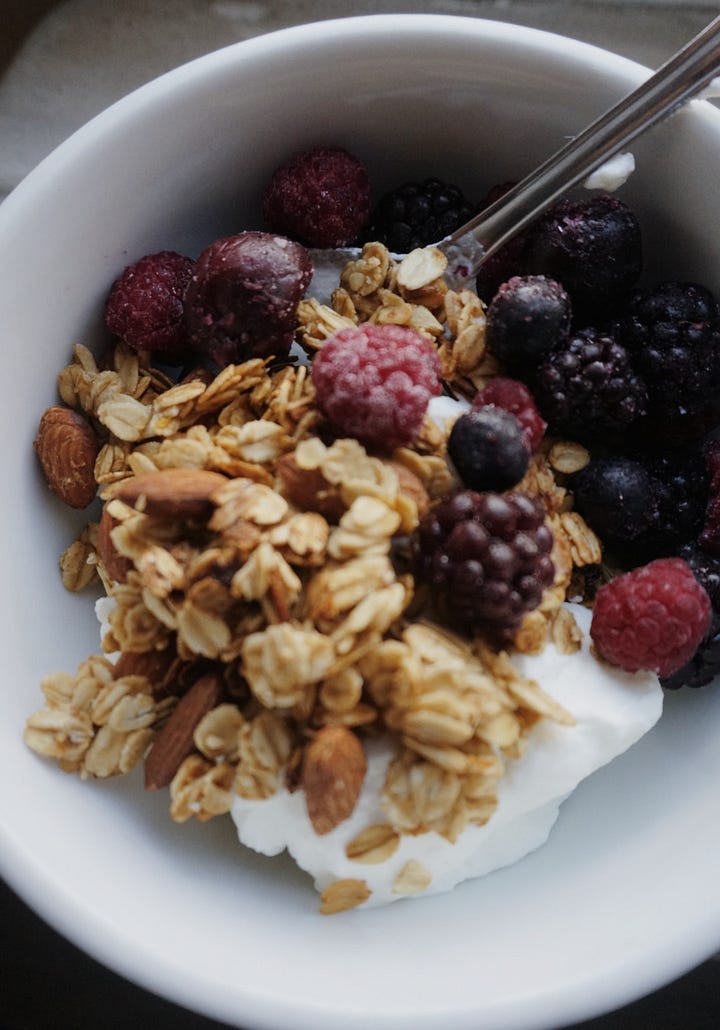
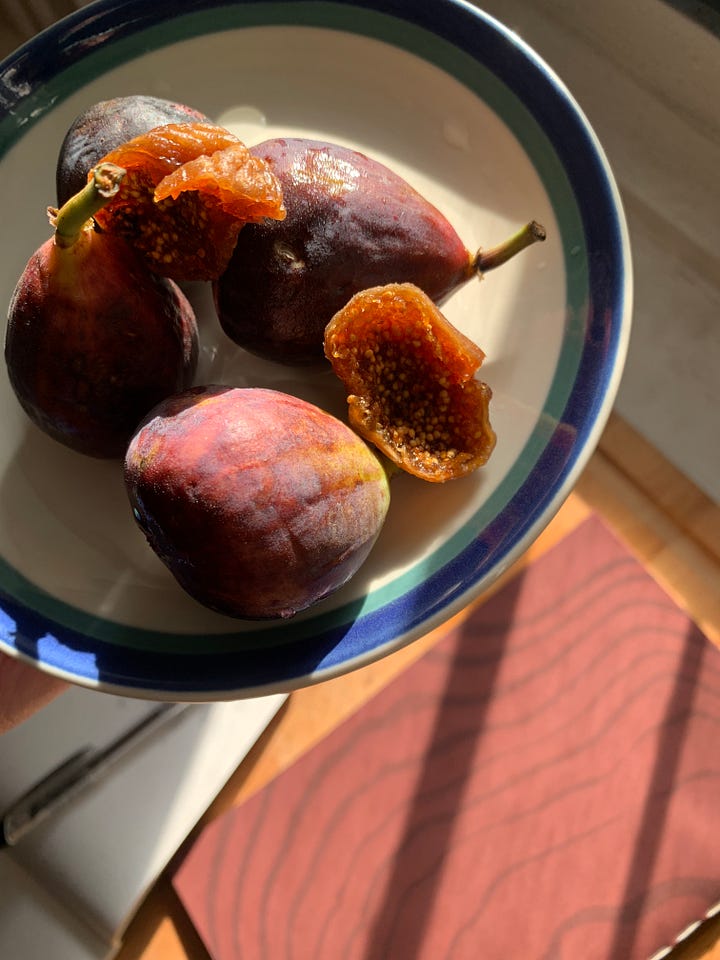
The practices of making — something, anything, but most often writing or cooking — have often been the places I have gone to sense, retrieve, or revive myself; writing and cooking are the steadiest, simplest, everyday rhythms that can drop us down from mind, into sense and body, pairing with it with recipe, taste, or idea. I find through writing, I learn to love food with a more vivid aliveness. “Food is what I love, and how I communicate love, and how I calm myself,” Tamar Adler writes. And hands, by nature of pen or food, give us ways to channel our minds.
I have been cooking, baking, painting, and writing as long as I can remember. I prefer to speak the language of hands, making something from flour, paper, or page; learning the world in texture, taste, tone, and touch; and in recent decades, to trust my words, hands, voice, and timing, equally. Like cooking, writing can nourish our lives; for me, both are, now, necessity for thriving and flourishing — writing as needed as wind in lungs and wonder, as movement and water, as plates deep with taste, as eating and breathing, or sounding and resounding and laughing. Those are the nutrients, in simplest form, of my practice in grounding.
Because cooking requires all senses to be on — or else risk something overdone, over salted, under tended — and because writing can bring us closer to feeling fully and flow states, writing and being with the colors and textures of words, ideas, and food, can bring us back, out of the over strength of mind, into the soft sensing of body and creating. Writing teaches me to open up — to page, idea, insight, perspective, while cooking teaches me to trust my hands in the process. Tune to salt, to sweet, to flame; learn the language of browning and cooling and timing, or how to learn, to rework, to rest, to revive. Food and word can be nutrient dense; both are potent, needed. Mounds of dough form and reform; words and sentences emulsify, come together, break apart, then find their way to coalesce again. In any case, there is some momentum, something that transforms into something else — and plate or page, and is more often than not, some sustenance, some nourishing.
In the last few years, I’ve dug deep. I’ve been digging deep into dirt — grounding down, getting to the deep rich of dark soil of life, feeling around for what matters — into tastes, into piles of flour, into what values; the deeper I go, the more I find myself revived in simplicity. A single apple cut in thin slices. The varied sacred nature of a can of chickpeas. Berries, only washed, nothing more or extravagant needed. What mattered to me — what I sought to care for and bring to form in years passed — decomposes now, as all new dishes and ideas flower and bloom to form. I thought for some time that food, as with writing, needed to be recipes followed and perfected, or drawn out; extravagant; and grandiose. Certainly, while truth sings how I love to push skill and taste and understanding through technique with knife, steam, baking, laminate, vegetable, texture and flavor, or sentence equally, I find resonance, increasingly, in both the complex, but more, in simplicity.
With writing we form words and ideas in ways that aim to take care or express, that let us know we are on our own sides. With cooking, I am on my own side, too, pairing the drive and desire to feed myself nourishing thoughts and ideas, bring myself and those I love plates, sentences, and tastes, moments that do the same with word and thought as my food does: grounds and inspires, journeys, brings into depth and complexity — playfully, and with deep meaning. How we love ourselves is often how we love each other, too; I will speak to you in sentences, and more, mostly, I will enthuse to share and pass you a plate, too. Because whether sentence or plate, the aim and intention is that each of us find ourselves, mouths and eyes full with expressing, nourishing, and thriving.
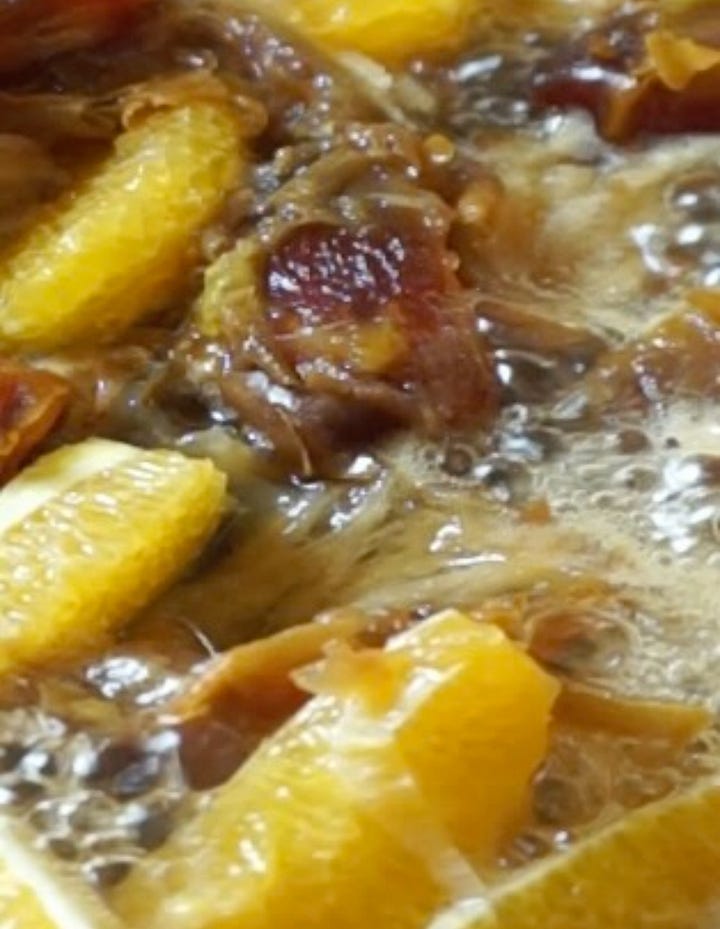
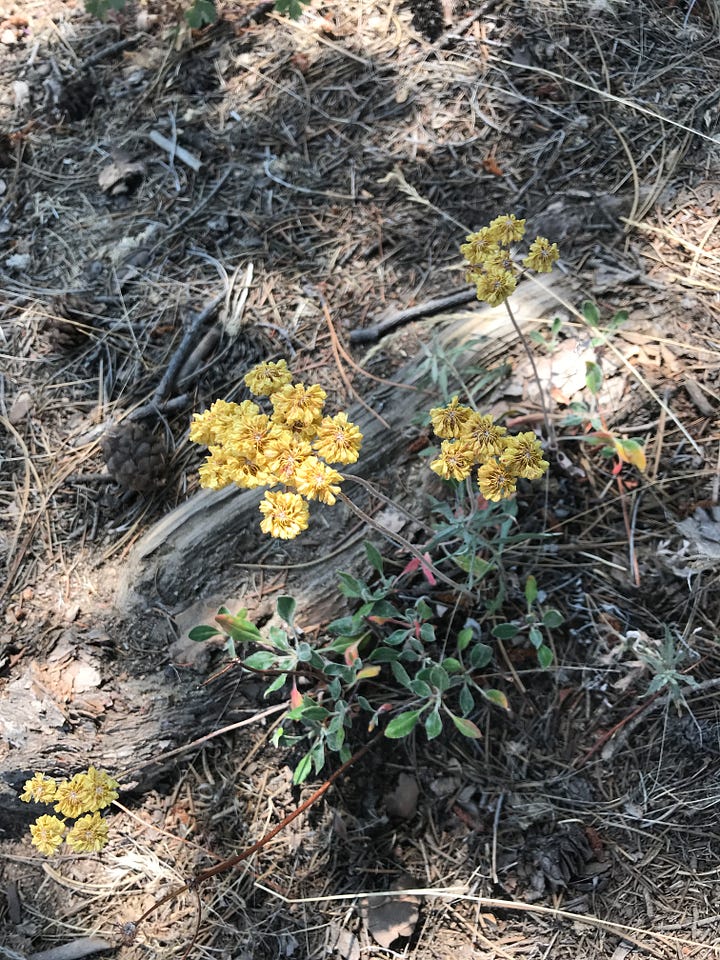
Flourish is ‘to blossom, to grow’. Flourish, or, also: ‘to adorn with flowers’. Food and writing can be simple and adapting. Nature is simple and adapting, and the simplest way to examine our natures, and revive ourselves with compassion and kindness is through writing and eating. Look closely at that which revives you, and find it beautiful in its simplicity. Take piece of fruit, cut it easily, then open mind and heart wide to the fresh expanse of first hints of ink across a blank white page while eating. Writing and cooking require attention, a steady focus, a simplicity, or a way to quiet mind so as to find the flow of the arriving experience. Then, whether all burners blaze with heat, or you find yourself in the quiet of a dimming kitchen, the desire to do something can come through you.
Flourishing and thriving, roses burst forth across the city, stilling their color and petals across sidewalks four stories down from the kitchen counter. I reach to morning, to afternoon and evening, into basket, and feel around for food, for taste, for idea. I have my breath, and I understand how to flow with it, thankfully; I have pen and screen, and there is ink and charge in both, thankfully; I have a mind thinking, and hands working, and choices for how to place and replace thoughts intentionally, thankfully; I have a heart with blood and rhythm, with wisdom and courage, writing and cooking, and for that, I am so grateful. I have page, I have flour, I have water, I have pen, I have thread of wonder, I have idea: simple nourishment in lines making and thinking. Lines cut into fresh pasta, into some cooling bake, and I draw up from lineages, learning to preserve berry and idea, how to open the eyes of wonder and garlic skin, and eventually, always, with plate or sentence, with heat or patience or time, something emerges.
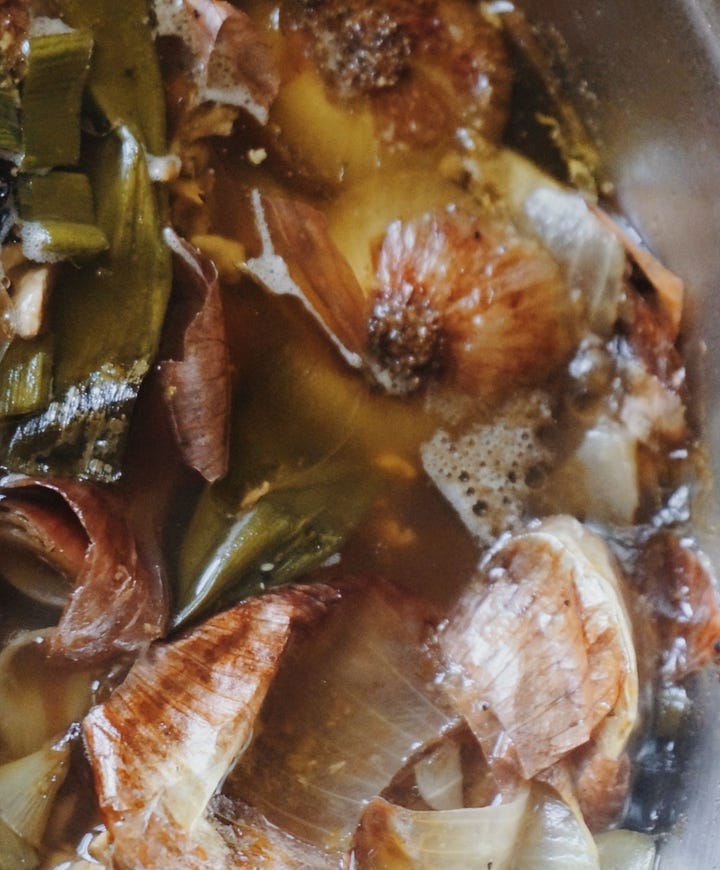
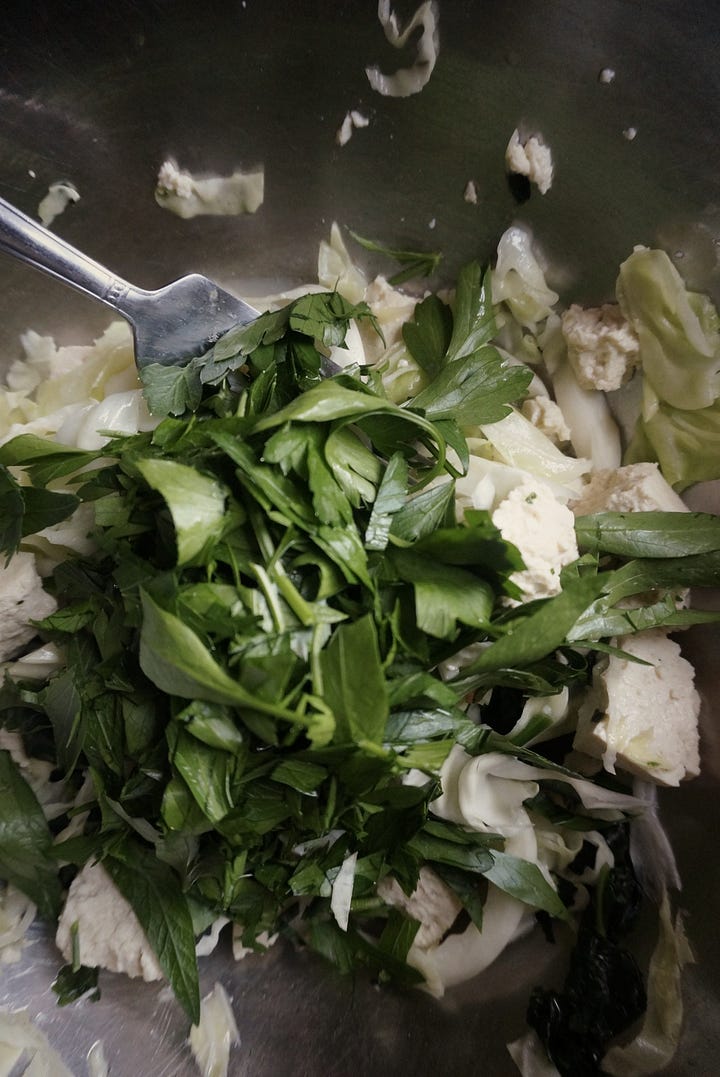
Food and word can be the simplest ways of creating. You may not adorn miles of sentences across pages in book deals, or hang paintings in vast galleries, or pull plates hot and adorned from some late night pass, but surely you’ve made pots of soup, or pulled small fish from a can to watch them glimmer, or swirled green oiled herbed sauces over steaming noodles with care, or laid a slice of cheese next to a jam or spread of bright butter next to the warm expanse of a slice of bread, and that warmth has no doubt rippled out: brought you joy, returned you more to energy, brought someone care, and like texture color of painting or sound, made their lives, even simply, or momentarily, more alive and beautiful. Writing and hunger come, and you meet each, coming to page and plate, to open phone, and write something, taste your life, from which you pull at the thread of anything.
Your idea stitches together heart and attention, a felt sense sutra, as your tastes break you apart in wonder then revive you back together again: through a word, a sentiment, a sentence, bite of salt, or the bright smile of a lemon. Instead of lack, in simplicity, I find myself abundant: in the simplicity of words, cooking. If there’s anything miles of running, pages of writing, hours of cooking, or time spent well in simple connection with the people I love most. That you can do a lot with seemingly little, and nourish mind and body, and make the moment very beautiful.
Nourished by, Nourishing:
A reread of An Everlasting Meal: Cooking with Economy and Grace by Tamar Adler and a restart of Islands of Abandonment by Cal Flynn.



